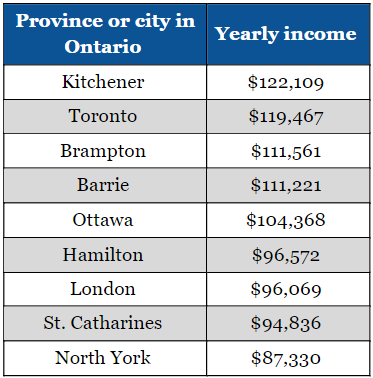
Becoming part of the legal profession in Canada has many benefits. Do you want to know how to be a lawyer in Ontario? Here is everything you need to know

The legal profession does not only promise stability and prestige, but it also offers a lifelong journey of continuous learning. On the practical side, becoming an attorney in Canada also offers competitive salaries and benefits. Due to these things and more, it is a dream for many people to become a lawyer.
Becoming a lawyer in Ontario, the largest legal sector in the country, offers many opportunities. The province has international law firms and established small- and medium-sized practices. Choosing to study and practice law in Ontario will do wonders for your legal career.
In this article, Canadian Lawyer will shed light on everything you need to know about how to be a lawyer in Ontario. We will discuss all the necessary steps as well as the financial rewards of this career. Do you want to know how long it takes to be a lawyer in Ontario? What does a typical day look like for these legal professionals? Read on to find out.
Becoming an attorney is not an easy feat to accomplish. It takes commitment and strength of character. The path to being part of the legal industry will test your resolve—it will make you realize if this career is truly for you.
If you want to know how to be a lawyer in Ontario, check out these seven steps:
Let us discuss each step on how to be a lawyer in Ontario below:
The first step in becoming a lawyer in Ontario is getting the Ontario Secondary School Diploma (OSSD). This is a diploma given to high school graduates in the Canadian province of Ontario. Anyone who completed the Ontario education curriculum will be granted this diploma. This includes those who graduated in:
This diploma will make you eligible for admission to a university program, which will serve as a ticket to taking the LSAT and entering law school. After passing the bar, you are just a few steps away from becoming a lawyer in Ontario.
After getting your high school diploma, you must get a bachelor’s degree from any college or university in Ontario. Here are some examples of universities in Ontario where you can get your undergraduate degree:
Once you obtain your university diploma, it is time for you to take the LSAT. This is a requirement for every aspiring law student in Ontario. Law schools will ask an applicant regarding their LSAT scores in determining whether they can be accepted.
While LSAT is a mix of multiple-choice questions and a writing test, it is designed to test your analytical thinking, reading comprehension, and reasoning. The LSAT has four multiple-choice sections and a writing portion. During your actual test day, you will have a 10-minute break between the second and third sections.
Interested in learning how to prepare for the LSAT? Know everything that you need to consider, and which law schools require the LSAT in this guide to LSAT preparation for aspiring lawyers.
If you pass the LSAT, you can apply to a law school in Ontario. Some law schools require a specific LSAT score while others are more lenient. You can also retake the LSAT five times in a single testing period and seven times over a lifetime. This can be done if you want to increase your LSAT score to qualify for your chosen law school. Be mindful of the law school’s entrance requirements for a smoother admission process.
Curious about how to apply to a law school in Ontario? Watch this video about a law student who got accepted into the University of Toronto Law School and Osgoode Hall Law School:
For more on UofT and Osgood Law, read our guide on the best law schools in Ontario.
To expand your options as far as Canadian law schools go, check out our complete guide to law schools across Canada.
Read next: Books for aspiring law students
Once you complete all your educational requirements, you will now have to pass the bar admission program. First, you need a Certificate of Qualification from the National Committee on Accreditation (NCA) before applying to the bar admission program of the Law Society of Ontario (LSO).
After that, you must apply to the LSO and become registered as a candidate in the lawyer licensing process. After being registered, successful candidates need to comply with the following:
If you are not from Ontario, here are the other law societies to choose from:
Not all provinces require bar exams – for example, Nova Scotia has removed the bar exam requirement. Contact the relevant law society to find out what’s required.
After taking the bar and passing it, the next step is to apply to a law practice program. These programs offer bar admission candidates in Ontario an intensive course of hands-on training on being a full-fledged lawyer. This can give them better chances of succeeding in the legal job market.
Once you become a member of the Law Society of Ontario’s legal licensing process, you might want to select this option as opposed to articling at a law firm or other law office. Check out these two existing law practice programs to choose from:
The last step on how to be a lawyer in Ontario is gaining experience throughout your journey as a newly minted lawyer. Seeking advice from seasoned attorneys can be beneficial as well. Eventually, you can also choose your area of focus such as:
See our practice areas page for additional information on what area you should focus on when you become a lawyer in Ontario.
If you want to become a construction lawyer, read this guide to the top construction law schools in Canada.
Lawyers in Ontario have the same average base salary of $44.90 per hour as every lawyer in the country. They can earn as much as:
Below is a comparative table showing the average base salary per year of lawyers from some of the provinces and cities in Ontario:

Just like other provinces and cities in Canada, it would take seven to eight years for you to become a lawyer in Ontario. It can even be longer than that in the event of delays. Read our article for a more detailed look at how long it takes to become a lawyer.
As per the steps above, you need to graduate from high school first, then get an undergraduate degree. After that, you will take the LSAT and study for another three years in law school.
Once you finish all your educational requirements, you will spend time preparing for the bar admission test provided by the Law Society of Ontario. Then, you can choose to apply for a law practice program and wait to be called to the bar. Only after you have completed all these steps on how to be a lawyer in Ontario will you be able to practice your profession.
Seems overwhelming? If you have doubts about whether you should become a lawyer, watch this clip:
Go over our guide on how to become a lawyer to help you make an informed decision.
Now that you have learned how to be a lawyer in Ontario, you might be more determined than ever to start your journey. On the other hand, you might also be weighing your decision.
You should realize by now that the path to becoming a lawyer, not just in Ontario, is not for those who easily give up. It is designed to be difficult because lawyers handle cases that can change a person’s life. Lawyers are tasked to uphold the law even when it seems harsh. Lawyers should be able to give counsel without bias and prejudice.
This is why you should think not just twice, but multiple times before deciding if the legal profession is for you. Remember, once you make the decision, it will become a commitment. As for additional resources that can help you in your journey on how to be a lawyer not only in Ontario, but in other Canadian provinces and cities, browse our Legal Education page.
What do you think about this guide on how to be a lawyer in Ontario? Let us know in the comments below.